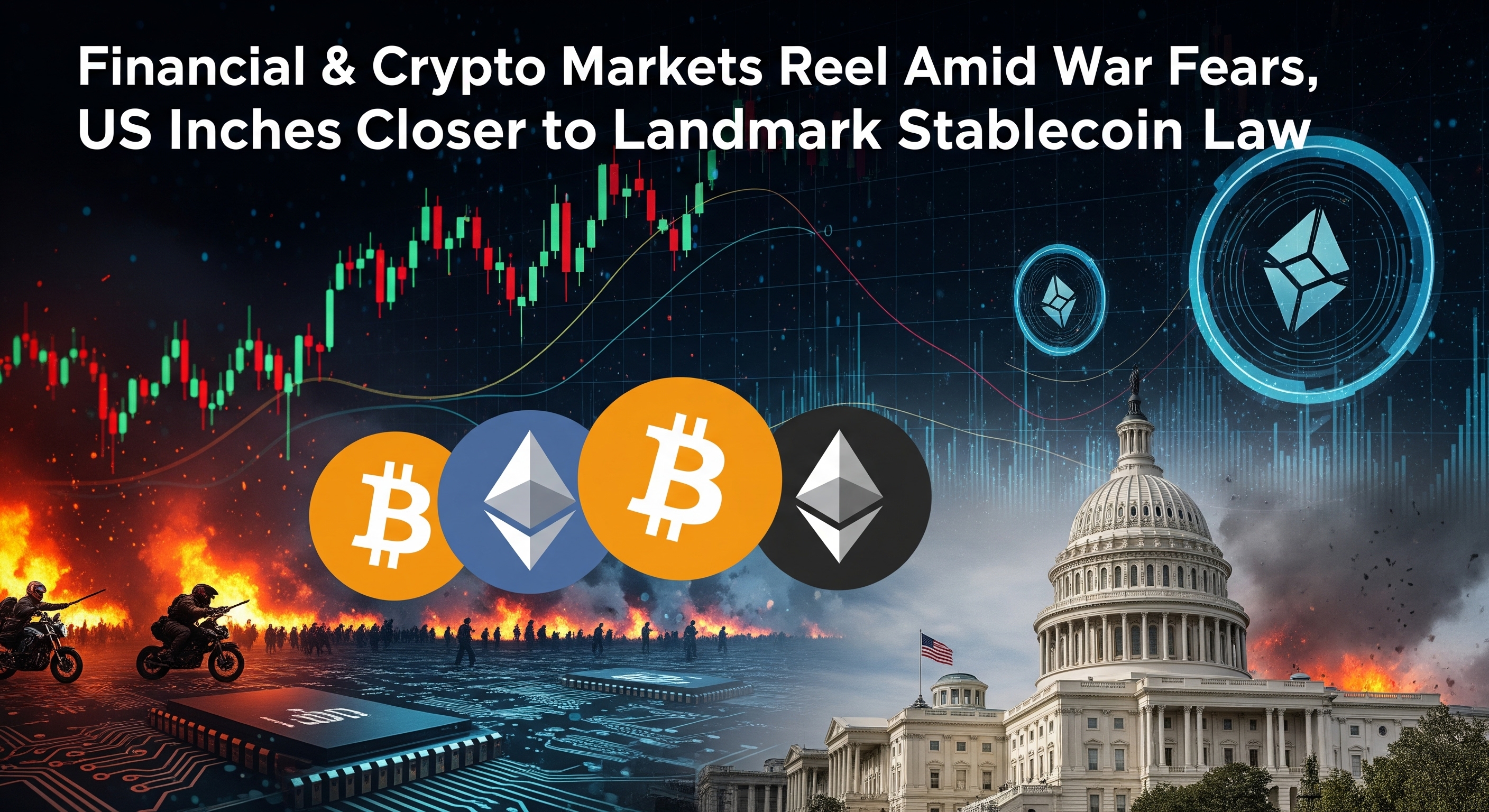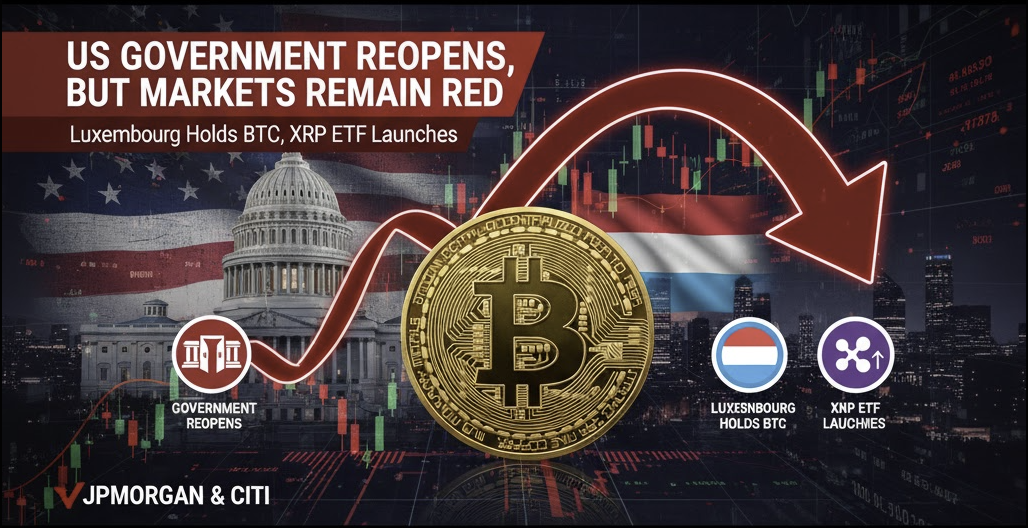Global financial and crypto markets continue to be impacted by ongoing geopolitical tensions, primarily stemming from renewed conflict concerns. Meanwhile, the United States is seeing positive momentum in crypto legislation, particularly concerning stablecoins.
Market Overview
US equities continued their downward trend on Tuesday, June 17th, with all three major indices closing in the red; the Nasdaq experienced the largest drop, down 0.91%. Oil futures saw a slight increase to $74.9 per barrel, while gold remained elevated at $3403 per ounce.

Bitcoin temporarily dipped to $104,000 before recovering slightly to around $105,000. Most major altcoins experienced declines. The overall crypto market capitalization decreased to $3.397 trillion.

ETF Flows and Liquidation Events
US Bitcoin spot ETFs recorded positive inflows of $216.5 million on Tuesday, with a significant portion coming from BlackRock's IBIT, although some funds saw outflows. ETH spot ETFs also experienced inflows, totaling $11.1 million.

Nearly $100 million in leveraged positions were liquidated within 60 minutes around the time Bitcoin's price saw a rapid decline. This rapid liquidation cascade was a significant contributing factor to the sharp downturn in BTC's value.
War is something no one wishes for, as it causes immense damage and widespread impact. However, in the long term, geopolitical conflicts like the Russia-Ukraine war or tensions between Israel, Iran, and the US often only have a temporary effect on financial and crypto markets. Initially, asset prices can fluctuate wildly due to anxiety, but after a period, markets typically stabilize.
Information related to war is often noisy, unclear, or contradictory, causing negative market reactions due to a lack of certainty. However, once information becomes clear, whether good or bad, the market can still recover. Generally, the long-term impact on financial markets from such conflicts is usually not significant, and we need to be discerning about information sources to avoid panic.
Escalating Iran-Israel Tensions: A Shifting Narrative
Yesterday, news emerged that the US and Iran were considering a meeting between US Special Envoy Steve Witkoff and Iranian Foreign Minister Abbas Araghchi this week. The aim was to discuss the nuclear deal and an end to the conflict between Israel and Iran.

However, President Trump later refuted reports of negotiations with Iran, asserting his readiness to engage in dialogue only if Iran initiated contact. He emphasized: "If they want to talk, they know how to reach me. They should have accepted the deal previously offered – that could have saved so many lives."
President Trump issued a stern warning to Iran's Supreme Leader, Ayatollah Ali Khamenei, calling him an "easy target" and confirming that the US knows his whereabouts. President Trump declared, "Our patience is running thin," stressing that Iran must surrender unconditionally before any tougher options are considered.
Subsequently, market participants received reports from the Wall Street Journal and Fox News suggesting that President Trump is considering the possibility of US military strikes targeting Iran, potentially including nuclear facilities. Meanwhile, the New York Times reported that Iran has prepared missiles and military equipment for retaliation, ready to strike US bases if Washington initiates hostilities. These conflicting reports create significant uncertainty and contribute to market volatility, highlighting the complex and rapidly evolving geopolitical landscape.
G7 Summit and Tariff Updates
German Chancellor Friedrich Merz stated that he expects a trade agreement with the United States to be reached before July 9th, within the framework of the G7 summit in Canada. However, he emphasized that this would not be a comprehensive agreement, but rather one focused on a few key sectors, particularly the automotive industry, which plays a crucial role in the German economy.
Chancellor Merz also affirmed that the negotiations are being conducted under the leadership of the European Union (EU) on behalf of the entire bloc, while rejecting the possibility of Germany signing a separate bilateral trade agreement with the US, as the United Kingdom had previously done. These discussions underscore the ongoing efforts to navigate complex trade relationships amidst global economic uncertainties.
United States Passes Landmark Stablecoin Bill in Senate
The US Senate has officially passed the "Genius Act" stablecoin bill. The bill has now been sent to the House of Representatives for further consideration. If approved by the House, the legislation will be presented to President Trump for his signature, enacting it into law.

President Trump has already stated that if the bill reaches his desk, he will sign it. This significant push for stablecoin legislation is a key reason why Wall Street firms are rushing into the crypto market. If this bill passes, it will be the first dedicated crypto law in the US, providing a foundational legal framework for the decentralized finance (DeFi) ecosystem.
Several major banks have already revealed plans to issue stablecoins. JPMorgan, the largest bank in the US, recently announced testing its JPMD token on the Base network (an Ethereum Layer 2 developed by Coinbase). This marks the first external deployment of JPMorgan's Kinexys blockchain technology beyond its internal system.
JPMD targets institutional clients, serving as a USD-based payment and transaction solution. A few days ago, JPMorgan also filed a trademark application for the JPMD platform, covering services related to trading, transfers, and the issuance of digital assets.
Furthermore, US Treasury Secretary Scott Bessent stated that the stablecoin market is projected to reach $3.7 trillion by 2030, a scenario made even more plausible if the GENIUS Act is passed. He emphasized that a robust stablecoin ecosystem would increase demand for US government bonds, helping to reduce government borrowing costs, curb national debt, and provide millions of global users access to a USD-denominated digital asset economy. This legislative progress and institutional interest signal a major turning point for the integration of stablecoins into mainstream finance.
Other Key Crypto Updates
Fold Holdings, a company focused on Bitcoin rewards, recently announced the establishment of a fund designed to raise up to $250 million. The capital will primarily be used to acquire additional Bitcoin to bolster the company's reserves, showcasing a growing trend of corporate treasury management allocating to Bitcoin.
The Ukrainian Parliament has introduced a draft law that would allow the National Bank of Ukraine to include assets like Bitcoin in its national reserves, alongside gold and foreign currency. This legislative move highlights increasing global recognition of Bitcoin's potential as a reserve asset.
Crypto exchange Gemini has filed a complaint against the Commodity Futures Trading Commission (CFTC), alleging that the agency has unfairly pursued a seven-year lawsuit based on the testimony of a discredited former employee and without evidence of intentional misconduct. Gemini also criticized the "toxic culture" within the CFTC but simultaneously expressed support for Acting Chair Caroline Pham's reform efforts. This move is seen as a strategic communications effort to protect the company's reputation and reshape its public image amidst ongoing regulatory scrutiny.
Coinbase, a leading cryptocurrency exchange, is seeking permission from the US Securities and Exchange Commission (SEC) to offer tokenized equities services. This initiative, if approved, would bridge traditional stock markets with blockchain technology, potentially revolutionizing how securities are traded and settled.
The SEC and Ripple have agreed to a request for the appellate court to pause the appeal, awaiting a ruling from Judge Torres that could allow the SEC to proceed with a settlement with Ripple. This development suggests a potential path toward resolution in the long-standing legal battle, which has significant implications for the classification of XRP and other cryptocurrencies.
Coinbase CEO Brian Armstrong recently visited London to meet with UK officials and advocate for the establishment of a clear, innovation-friendly regulatory framework for the crypto sector. His efforts underscore the industry's desire for regulatory clarity to foster growth and adoption.
Eric Trump, son of President Donald Trump, stated that he is a fan of Tron and greatly admires Justin Sun but denied reports that he would be joining the newly formed Tron Inc. This clarification addresses speculation linking the Trump family more directly to specific crypto projects.
iPower, an e-commerce and supply chain platform leveraging technology, recently announced its strategic shift to become a crypto treasury company and provide blockchain infrastructure services. The company will begin accumulating Bitcoin and expand into blockchain-related services, including cloud mining, home mining equipment, and cold storage wallet solutions to securely store digital assets. This move highlights the growing trend of companies integrating Bitcoin and blockchain directly into their core business models.
The SEC has delayed its decision regarding Franklin Templeton's Spot XRP ETF and has opened a public comment period until the end of July. According to Bloomberg analyst James Seyffart, this delay was anticipated and does not alter the likelihood of approval this year, which is currently estimated at 85%. This indicates continued progress for XRP as an investment vehicle, despite regulatory hurdles.
Sources
- Bloomberg
- CoinDesk
- U.S. Treasury
- TradingView
- Reuters
- SEC
- Wall Street Journal
- Fox News
- New York Times
- General Department of Taxation, Vietnam
Disclaimer
This article is for informational purposes only and should not be considered financial advice. Please do your own research before making investment decisions.


.png)





